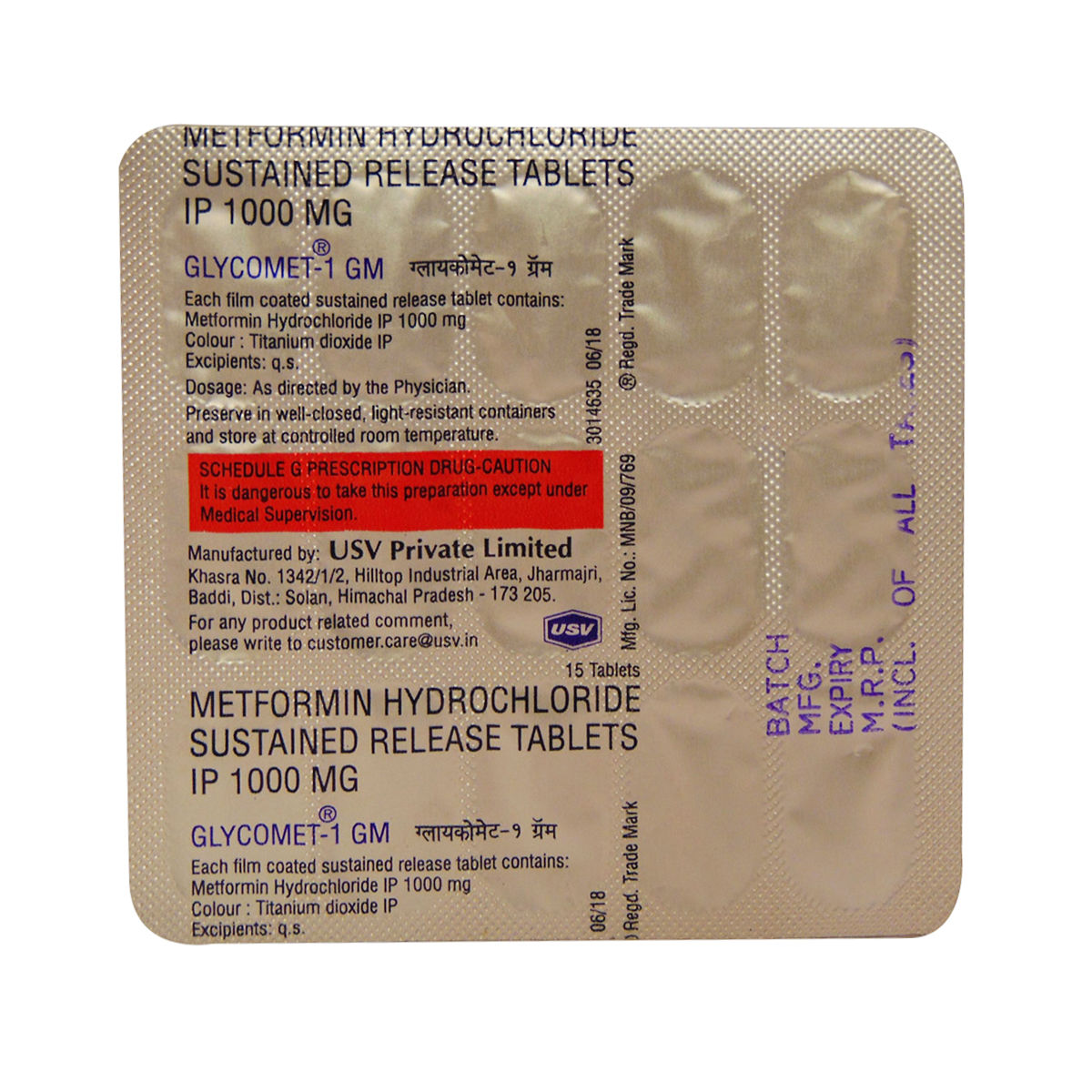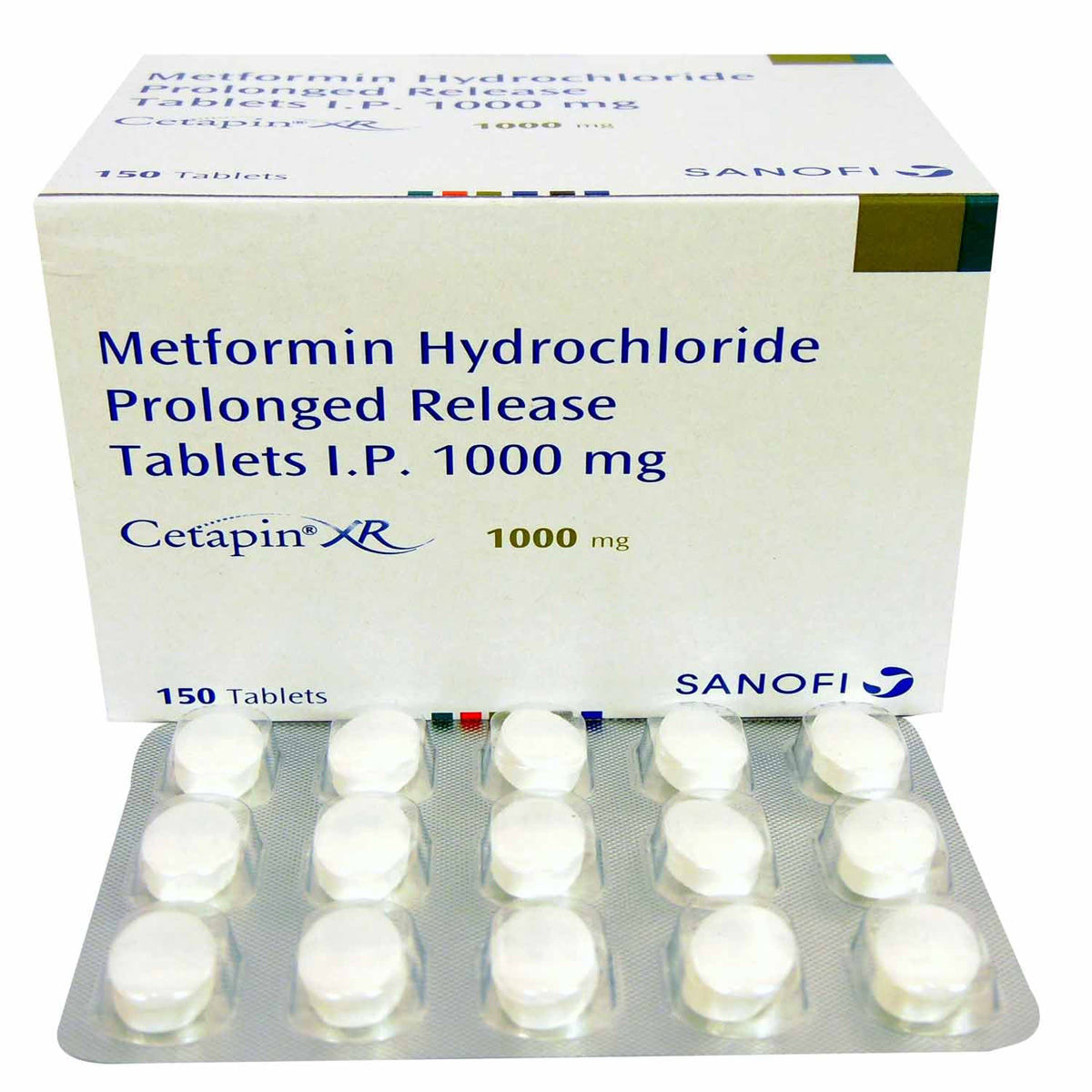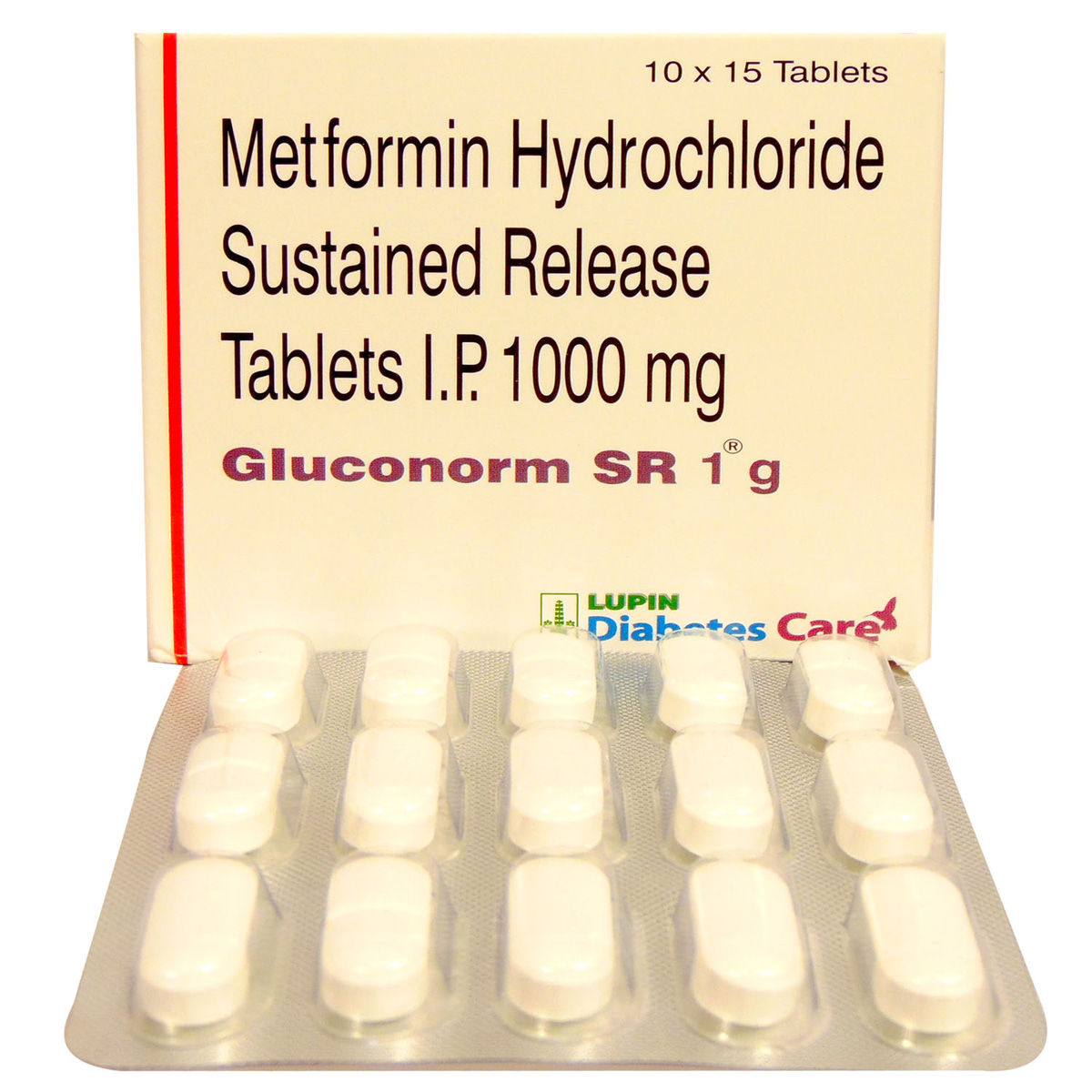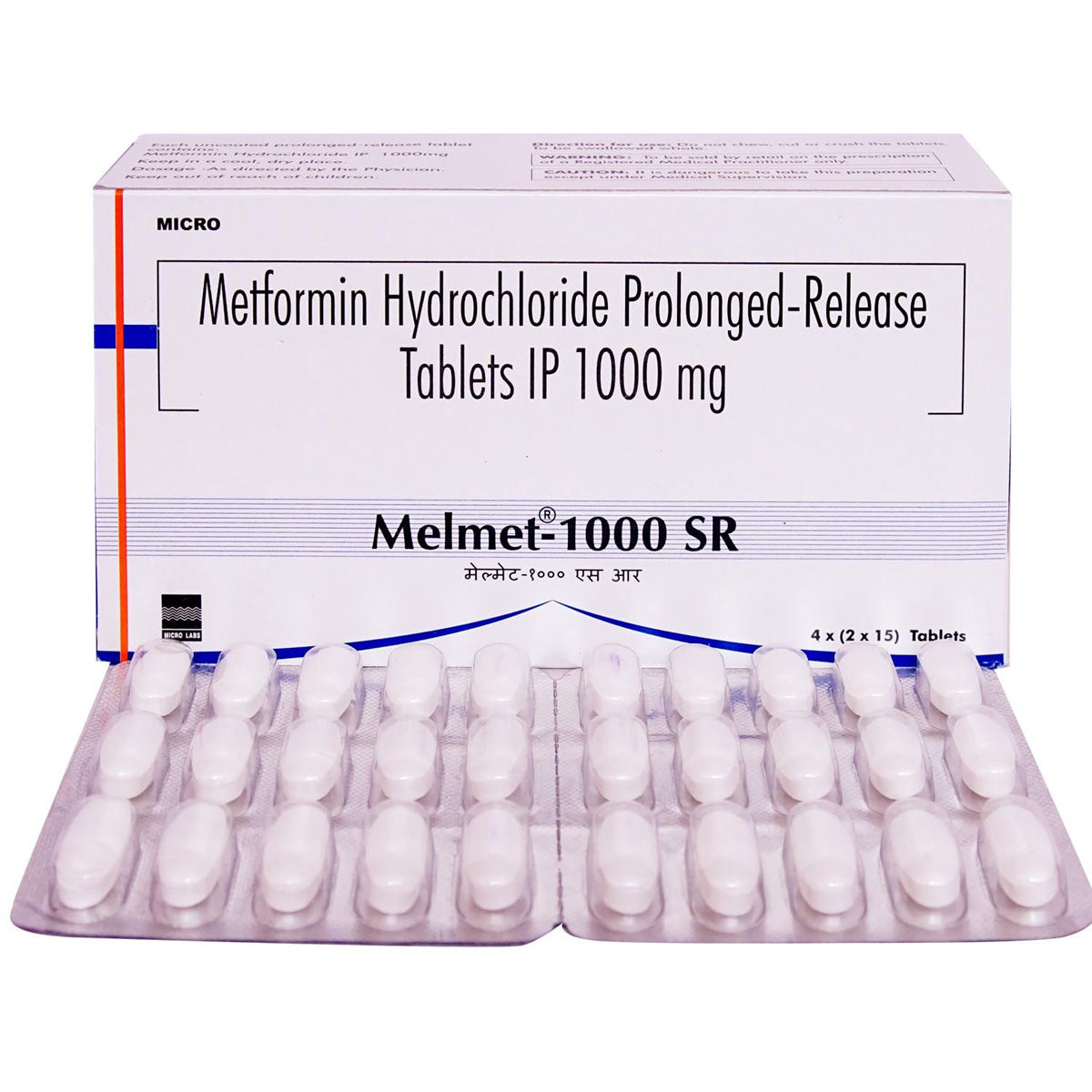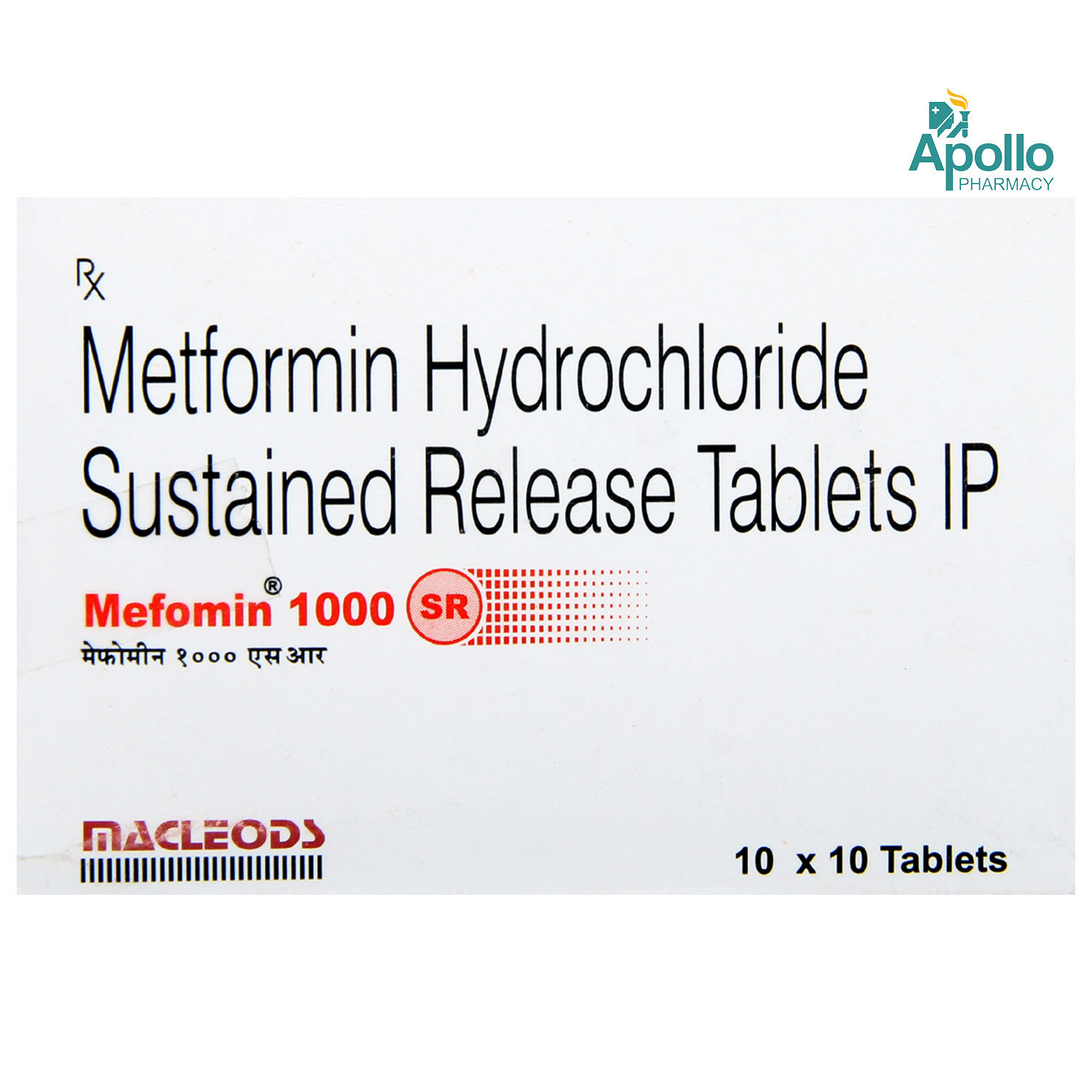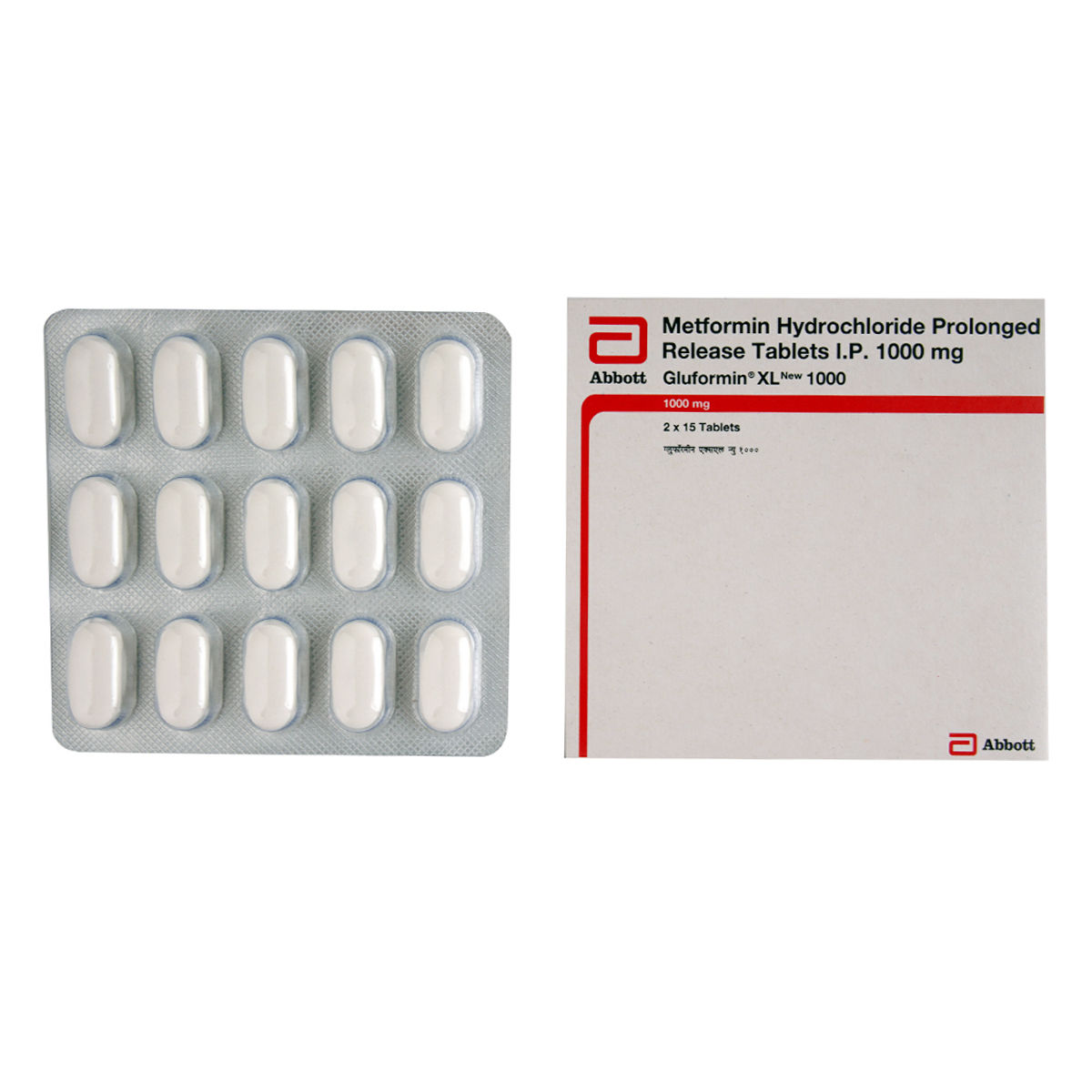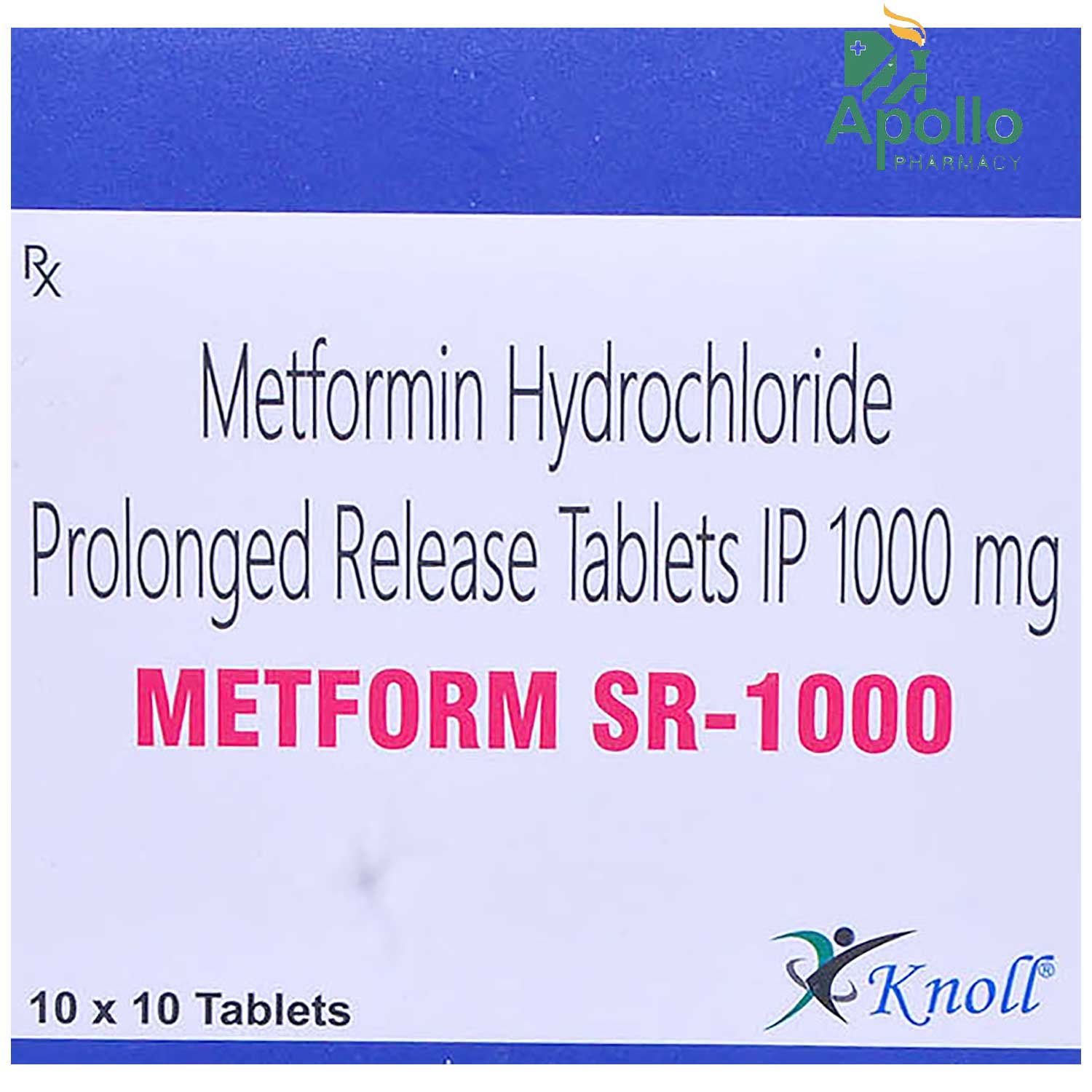Glyciphage SR 1 gm Tablet 10's
Glyciphage SR 1 gm Tablet is used to treat type 2 diabetes. It contains Metformin, which works by decreasing the amount of glucose absorbed from the food and the amount of glucose made by the liver. It also increases the body's response to insulin, a natural substance that controls the amount of glucose in the blood. Thereby, it helps control the amount of glucose (sugar) in the blood. In some cases, it may cause side effects like nausea, vomiting, diarrhoea, abdominal pain, and loss of appetite. Before taking this medicine, you should tell your doctor if you are allergic to any of its components or if you are pregnant/breastfeeding, and about all the medications you are taking and pre-existing medical conditions.
₹40.5*
MRP ₹45
10% off
₹38*
MRP ₹45
15% CB
₹7 cashback(15%)
Free Delivery
With Circle membership
(Inclusive of all Taxes)
This offer price is valid on orders above ₹800. Apply coupon PHARMA10/PHARMA18 (excluding restricted items)
Provide Delivery Location

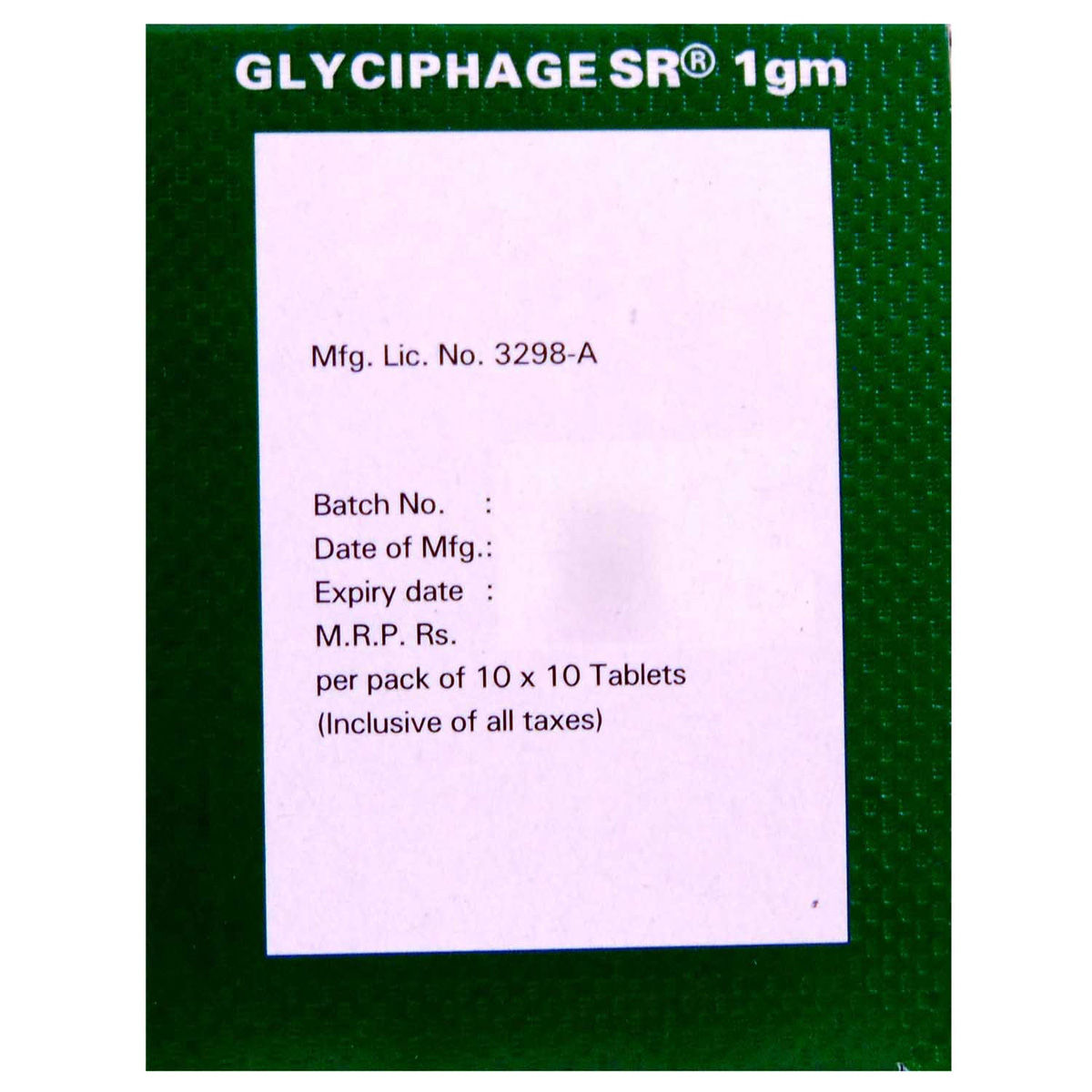
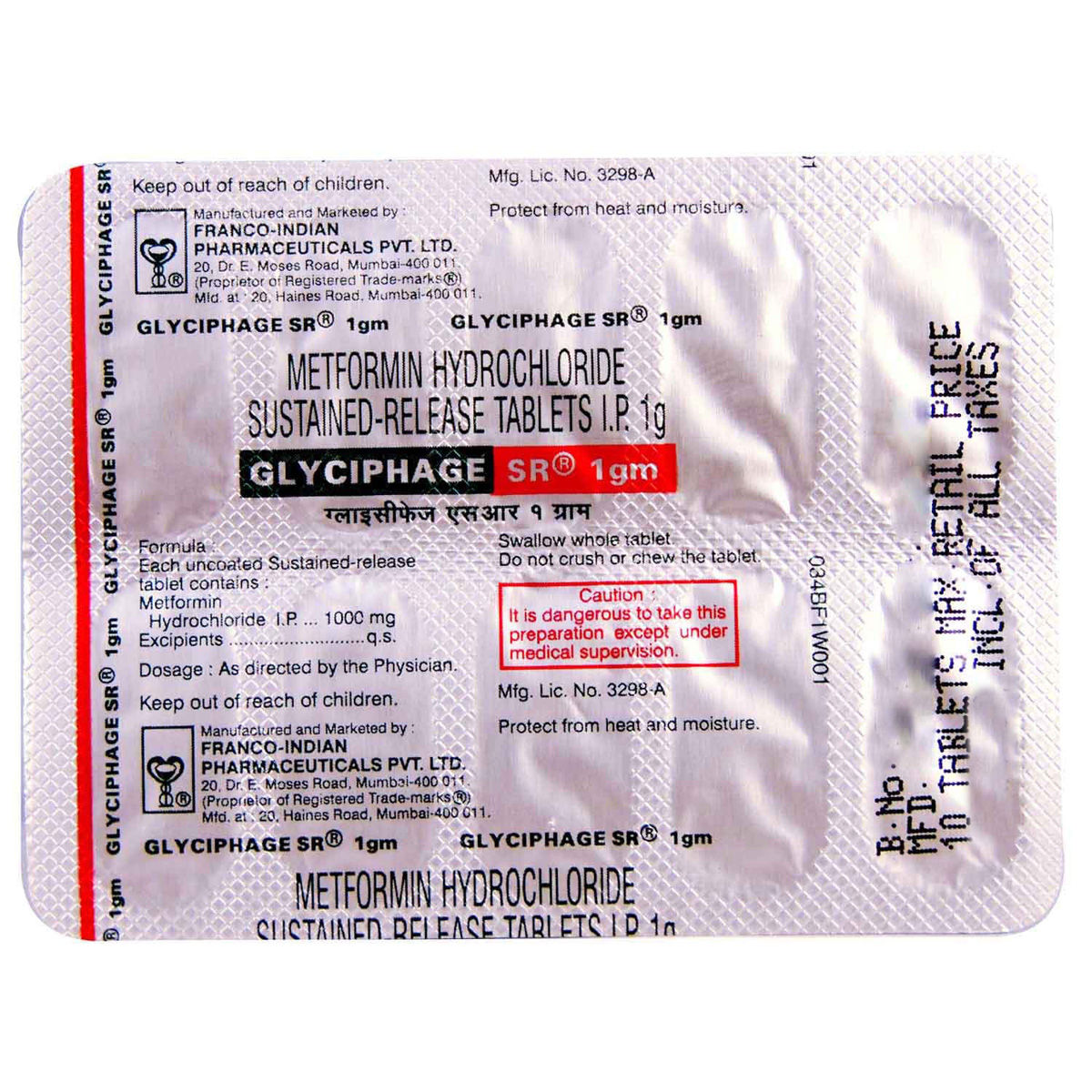
Whats That

Secure Payment

India's Most Trusted Pharmacy

Genuine Products
Synonym
Composition
Manufacturer/Marketer
Consume Type
Return Policy
Expires on or after
About Glyciphage SR 1 gm Tablet
Glyciphage SR 1 gm Tablet used to treat type 2 diabetes. It belongs to a group of anti-diabetic medicines called biguanides. Type 2 diabetes is a chronic or lifelong disorder that affects the way our body processes glucose. Glyciphage SR 1 gm Tablet is prescribed for the condition of type 2 diabetes when diet and exercise alone have not been enough to control the blood glucose levels.
Glyciphage SR 1 gm Tablet contains Metformin, which works by decreasing the amount of glucose absorbed from the food and the amount of glucose made by the liver. It also increases the body's response to insulin, a natural substance that controls the amount of glucose in the blood. Thereby, Glyciphage SR 1 gm Tablet helps control the amount of glucose (sugar) in the blood.
In some cases, Glyciphage SR 1 gm Tablet may cause side effects like nausea, vomiting, diarrhoea, abdominal pain, and loss of appetite. Most of these side effects do not require medical attention and resolve gradually overtime. However, if the side effects persist or worsen, consult the doctor.
Do not take Glyciphage SR 1 gm Tablet if you are allergic to any of its components. Consult the doctor if you are pregnant or breastfeeding. Glyciphage SR 1 gm Tablet is safe for use in children above 10 years if prescribed by the doctor. Keep the doctor informed about your health condition and medications to rule out any side effects/interactions.
Uses of Glyciphage SR 1 gm Tablet
Medicinal Benefits
Glyciphage SR 1 gm Tablet plays a vital role in managing diabetes and achieving good control of blood sugar levels by delaying the absorption of sugar and increasing insulin sensitivity in the body. Glyciphage SR 1 gm Tablet does not cause a sudden lowering of the blood glucose level or cause significant hypoglycaemia. Unlike other anti-diabetic therapies like sulfonylureas or insulin, Glyciphage SR 1 gm Tablet does not cause weight gain but may cause modest weight loss. In the prediabetic condition, Glyciphage SR 1 gm Tablet is the only recommended treatment available. Glyciphage SR 1 gm Tablet also helps to prevent serious complications of diabetes such as kidney damage (diabetic nephropathy), blindness (diabetic retinopathy), loss of sensation in your hands and feet (diabetic neuropathy) or even loss of foot. Glyciphage SR 1 gm Tablet also helps to reduce your chance of having a heart attack or stroke.
Directions for Use
Storage
Side Effects of Glyciphage SR 1 gm Tablet
- Digestive problems
- Nausea
- Vomiting
- Diarrhoea
- Abdominal pain
- Loss of appetite
Drug Warnings
Do not take Glyciphage SR 1 gm Tablet if you are allergic to any of its components or if you have severe kidney disease, diabetic ketoacidosis, or metabolic acidosis. Inform the doctor if you have dehydration, infections, liver or kidney problems, uncontrolled diabetes, heart problems, or low levels of vitamin B12. Consult the doctor if you are pregnant or breastfeeding. Seek medical attention if you experience symptoms of lactic acidosis (vomiting, abdominal pain, muscle cramps, severe tiredness, difficulty breathing, and reduced body temperature and heartbeat) or dehydration (severe vomiting, diarrhoea, exposure to heat, fever or if you drink less fluid than normal).
Drug Interactions
Drug-Drug Interactions: Inform the doctor if you are taking anti-diabetic (insulin glargine), diuretic (furosemide), or thyroid hormone (levothyroxine).
Drug-Food Interactions: No interactions found/established.
Drug-Disease Interactions: Inform the doctor if you have lactic acidosis, liver or kidney problems, low blood glucose or vitamin B12 levels.
Drug-Drug Interactions Checker List
- INSULIN GLARGINE
- FUROSEMIDE
- LEVOTHYROXINE
Habit Forming
Diet & Lifestyle Advise
- Invest at least 150 min of your week in moderate-intensity physical activity or one hour and 15 minutes of high-intensity exercise every week.
- Losing weight gradually to achieve a healthy body mass index (18.5 to 24.9).
- Replacing refined carbohydrate-containing foods with whole grain foods and increasing intake of fruits and veggies and other fibre-enriched foods.
- Reduce intake of saturated fat (or hidden fats) in food like chips, crisps, pastries, biscuits, and samosas. Choose omega-3 fatty acid-containing oils for daily cooking. For frying, you can use palm oil, mustard oil, groundnut oil, rice bran oil, and safflower oil.
- Avoid taking too much stress as it may elevate your blood sugar level. You can adopt stress management techniques like mindfulness to control stress-related blood sugar changes or meditation or yoga.
- Opt for low-fat dairy products (low-fat yoghurt, fat-free milk, cheese, etc.).
- Keep your blood pressure as normal (140/90) as possible, as it reduces the risk of cardiovascular diseases in diabetes patients.
Special Advise
- Keep taking Glyciphage SR 1 gm Tablet even if you think your blood sugar levels are under control. If you miss a dose, do not take a larger dose; consult your treating physician for advice.
- Take short, frequent meals, and avoid prolonged fasting when taking Glyciphage SR 1 gm Tablet . Beware of symptoms of hypoglycaemia (low blood sugar), which include sweating, dizziness, palpitations, shivering, intense thirst, dry mouth, dry skin, frequent urination, etc. Whenever you experience any of the above-mentioned symptoms, immediately consume 5-6 candies, 3 glucose biscuits or 3 teaspoons of honey/sugar and also get in touch with your physician. Make sure to carry these with you at all times, especially during long travels.
- Avoid drinking alcohol while on Glyciphage SR 1 gm Tablet as it increases the risk of hypoglycaemia (a decrease in blood sugar, which might be fatal in some cases) and lactic acidosis (when the lactic acid increases in the body, which impacts the functioning of various organs in the body).
- Try to quit smoking and reduce your intake of carbohydrate-rich food like potatoes, rice, mangoes, bread, sugar, etc.
- Remember, lifestyle modifications are the most important step in controlling blood sugar levels.
Disease/Condition Glossary
Type 2 diabetes: It is a chronic or lifelong disease that keeps the body away from properly utilizing insulin. Hence, people affected with type 2 diabetes either do not produce enough insulin or there is resistance to the action of insulin. Middle-aged or older are most likely to suffer from type 2 diabetes, so it is also known as adult-onset diabetes. Symptoms of type 2 diabetes include increased thirst, frequent urination at night, slow wound healing, increased hunger, fatigue, and blurred vision. In some cases, there may be weight gain, while in rare cases, weight loss may be observed. The complications of type 2 diabetes also include neuropathy (nerve problems), nephropathy (kidney problems), retinopathy (damaged retina of eyes or blindness), loss of limbs, sexual dysfunction, and increased chance of heart attack or stroke.
Alcohol
Unsafe
It is advisable not to consume alcohol along with Glyciphage SR 1 gm Tablet to avoid unpleasant side effects like lactic acidosis.
Pregnancy
Caution
Consult the doctor if you are pregnant. This medicine should be used during pregnancy only if clearly needed.
Breast Feeding
Caution
Glyciphage SR 1 gm Tablet is not recommended if you are breastfeeding or if you are planning to breastfeed your baby.
Driving
Safe if prescribed
Glyciphage SR 1 gm Tablet may not affect your ability to drive. However, drive or operate machinery only if you are alert.
Liver
Caution
Glyciphage SR 1 gm Tablet to be taken with caution, especially if you have a history of liver diseases/conditions. The dose may have to be adjusted by your doctor.
Kidney
Caution
Glyciphage SR 1 gm Tablet to be taken with caution, especially if you have a history of kidney diseases/conditions. The dose may have to be adjusted by your doctor depending on your renal functions. Glyciphage SR 1 gm Tablet is not recommended in severe kidney disease. Regular monitoring of kidney function tests is therefore important if you're taking Glyciphage SR 1 gm Tablet .
Children
Safe if prescribed
Glyciphage SR 1 gm Tablet is not recommended for children below 10 years of age. For children above 10 years, the dose will be recommended by the doctor.
Country of origin
Manufacturer/Marketer address
Author Details
We provide you with authentic, trustworthy and relevant information
FAQs
Disclaimer
Customers Also Bought
Product Substitutes
Recommended for a 30-day course: 3 Strips








